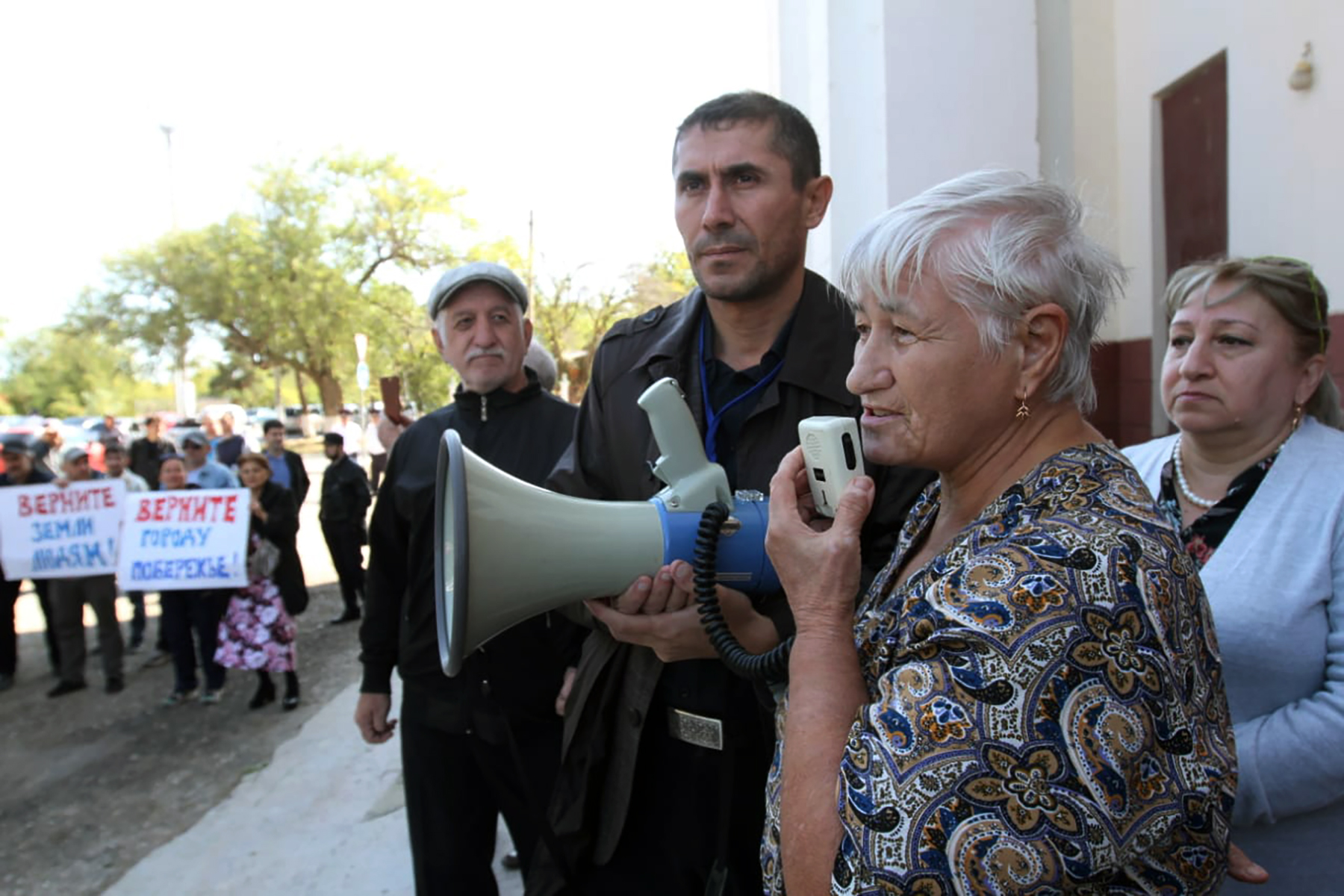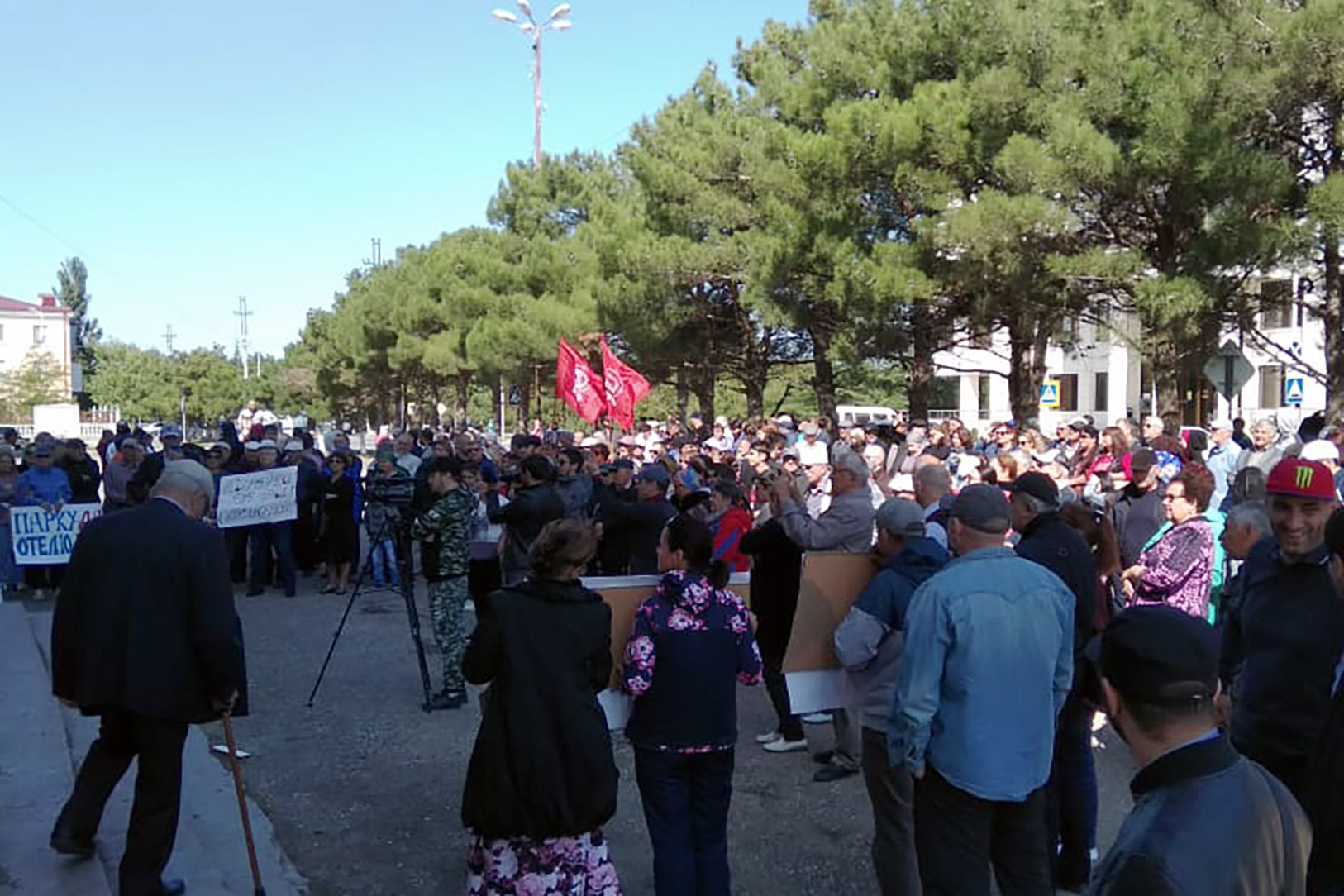

Around 150 residents of the city of Kaspiysk in the southeast of the Russian republic of Daghestan gathered at a protest on Sunday against the new master plan of development for the city.
The new master plan authorised possible constructions along the seashore and in park areas. A similar protest took place in October 2018 urging the mayor of Kaspiysk not to approve amendments to the urban plan.
Protesters gathered at the cultural centre of the Dagdizel plant, which, according to the new master plan, could be demolished and replaced by high-rise buildings.
Protesters held posters accusing the Mayor’s Office of corruption and demanding restrictions on construction along the coast.
Marat Ismailov, a lawyer at local public organisation Kaspiysk — Our City, told OC Media that the Kaspiysk administration initially refused to allow the group to hold a rally, but he successfully appealed this decision in court.

According to Ismailov, a court in the Daghestani capital Makhachkala is currently considering a lawsuit by the mayor of Kaspiysk, Magomed Abdulayev, against Daghestan’s Cultural Heritage Protection Agency. The agency has recognised the Dagdizel House of Culture as a protected monument of cultural and historical heritage.
The Dagdizel plant sold the House of Culture along with several other areas to Izberbashskiy, a local alcoholic drinks producer. Izberbashskiy, which was founded by Kaspiysk Mayor Magomed Abdulayev, plans to develop residential buildings in this area.
In early August, residents of Kaspiysk held single-person pickets to oppose amendments in the master plan, and on 6 September, activists of Kaspiysk — Our City protested in the central square of Makhachkala.
Comments rejected
Khabib Aygumov, an activist at Kaspiysk — Our City, told OC Media that activists and local residents in Kaspiysk had been opposing the changes to the city’s master plan since 2017.
According to him, the Prosecutor’s Office of Kaspiysk had overturned ‘illegal decisions’ by the local authorities to legitimise infill development — construction on undeveloped land within the city — without holding public hearings.
Aygumov told OC Media that this time the Kaspiysk administration had ‘managed to exclude the opinions of the people’, since in May, amendments were made to Russian urban planning legislation that allowed municipalities to choose between public hearings or public discussions.
According to him, the city council of Kaspiysk subsequently adopted a normative act on public discussions when adjusting the master plan. This meant that residents could only submit comments and suggestions on the urban development document which the commission must consider before making a final decision.
Local resident Svetlana Bagmet told OC Media that they had sent four collective and personal appeals, 48 proposals, and 40 comments before 19 August, but that all of them were rejected by the commission, which is comprised of city hall officials.
She said that after the adjustments to the master plan were approved, it would be possible to construct multi-story residential buildings and commercial facilities on the embankment, park territories of the Dagdizel plant and of the House of Culture.
According to her, only the Trud Stadium in Kaspiysk, which was also on the list of objects for further construction, was saved, since the Chairman of the Government of Daghestan, Artyom Zdunov, committed to renovating it.
‘It will cover the sea view’
On 11 September residents of a block of flats near the beach in Kaspiysk started a spontaneous protest after they learned that construction work started in the coastal zone.
One local resident, Akhmed Gadzhiyev, told OC Media that people were outraged when they saw a fenced-off area in the coastal zone. They demolished the fence and called the police to stop the work.
‘We wrote a complaint to the Prosecutor’s Office with a request to verify the legality of the construction work. They are planning to build an apartment hotel 68 metres high on this site. This building will block the sea view and will not leave room for a park zone, and there will also be a huge load on utility networks’, Gadzhiyev said.
A spokesperson for the Kaspiysk administration told OC Media that the investor, Kapital-Invest, had all the necessary permits.
Magomedali Bagandov, a representative of Kapital-Invest, told OC Media that the residents were aware that an apartment hotel would be built on the site, and some of them even asked the company to buy adjacent plots of land from them.
‘I bought their plots, I developed a new project, which included a water park, a dolphinarium and a park’, Bagandov said.
According to him, the project is part of the federal Monotowns Fund — which provides funding for towns and cities previously dominated by a single industry — which will provide ₽250 million ($3.9 million) to install sewage and treatment facilities and a power plant to ease the burden on utilities in the area.







